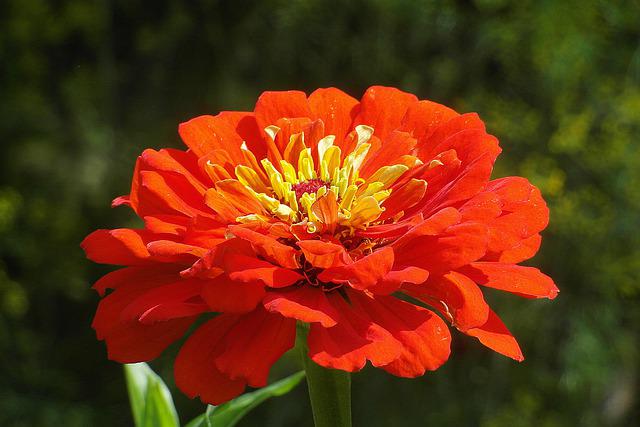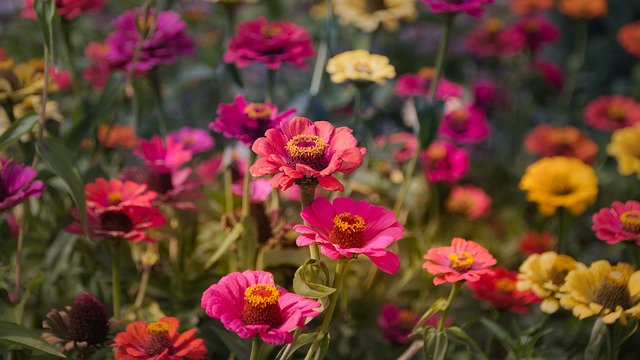Do Rabbits Eat Zinnia?

Zinnias are safe to eat for animals. However, it depends on the specific rabbit’s diet and preferences. Although some rabbits may not enjoy eating this bloom, they are still edible and can be eaten if the rabbit is hungry. Some rabbits may enjoy eating zinnias, while others may not be particularly fond of them.
Table of Contents
Do Bunnies Like To Eat Zinnias?
Zinnias are not a favorite of rabbits. Although there isn’t a clear explanation for why they tend to stay away from zinnias, it is widely believed that they don’t like them because of their overpowering aroma and prickly centers. If they can’t find anything to eat, they might be able to munch on zinnias at any time.
If you keep rabbits as pets, you might be surprised to learn that they are the ones consuming your zinnias.
Even though most of the study indicates that rabbits don’t like zinnias, they might eat the plant for fun. The plants may also be consumed by rabbits still experimenting with their palates.
The intriguing truth is that because they are so selfish, it is easy to identify them as the guilty party. Rabbits consume all or a sizable percentage of the leaves when they graze.
This implies that you might wake up one day to find only the stem of your plant still standing.
In addition, after finishing their snack on the leaves, they frequently leave some of their waste behind. If you notice these symptoms, you can be certain that rabbits are eating your zinnias.
Most animals are drawn to zinnias by their beautiful fragrance and bright, vibrant color. Where rabbits dislike zinnias, they consume nearly everything in the garden. Even though there is no biological justification for it, they consistently tend to avoid zinnias.
Animals can detect the potent scent of zinnias from a distance. Since zinnias have a strong scent, rabbits stay away from them. In addition, zinnias are tough, prickly flowers. Because of this, zinnias are resistant to deer and rabbits.
Among the plants that rabbits avoid are common zinnias (Zinnia elegans) and lower-growing creeping zinnias (Zinnia angustifolia). Both enjoy spending time in the sun; from summer till frost, they bloom in every hue but genuine blue.

Which Odors Do Rabbits Detest?
Most commercially marketed repellents for rabbits imitate the smell of urine or musk from prey. Blood, red peppers that have been crushed, ammonia, vinegar, and garlic are all offensive to rabbits. As mentioned earlier, zinnias have a strong scent. So, if you plant them close to your home or in an area that rabbits frequent, they will likely avoid them. For those of you who are wondering, no, rabbits do not like to eat zinnias leaves.
How To Prevent Your Rabbit From Visiting Your Garden
Plant Different Varieties of Plants Rabbits Don’t Like
Since rabbits and deer tend to dislike the same things, putting in plants rabbits don’t like to eat is also a good way to keep deer away. Forsythia, lilac bush, marigolds, zinnias, daffodils, lavender, and snapdragons are all beautiful options that keep rabbits away.
Make Your Garden Less Appealing to Invaders
This seems a simple step, but if you don’t let rabbits in the first place, it’s easy to get rid of many of them. Rabbits only live where they can hide from predators, like gardens with low-growing shrubs, brush piles, tall grass, errant sheds, and other broken-down buildings. Getting rid of these parts of your garden makes it look better and less likely that rabbits will move in for good.
Protect Plants With Fencing
Rabbits can only be eradicated through fencing, which is both humane and effective. The best way to keep rabbits from eating your plants is to use chicken wire or mesh fencing to protect them from the outside world. If the fence is buried at least a foot below the surface and above the surface in an “L” shape facing outward, the vinyl-coated fence material can be reused yearly. It is important to bend the bottom of the fence to form a right angle with the portion of the fence sticking out above ground when we say “L shape facing outward.”
